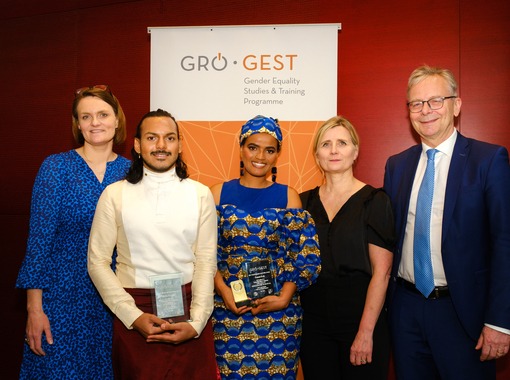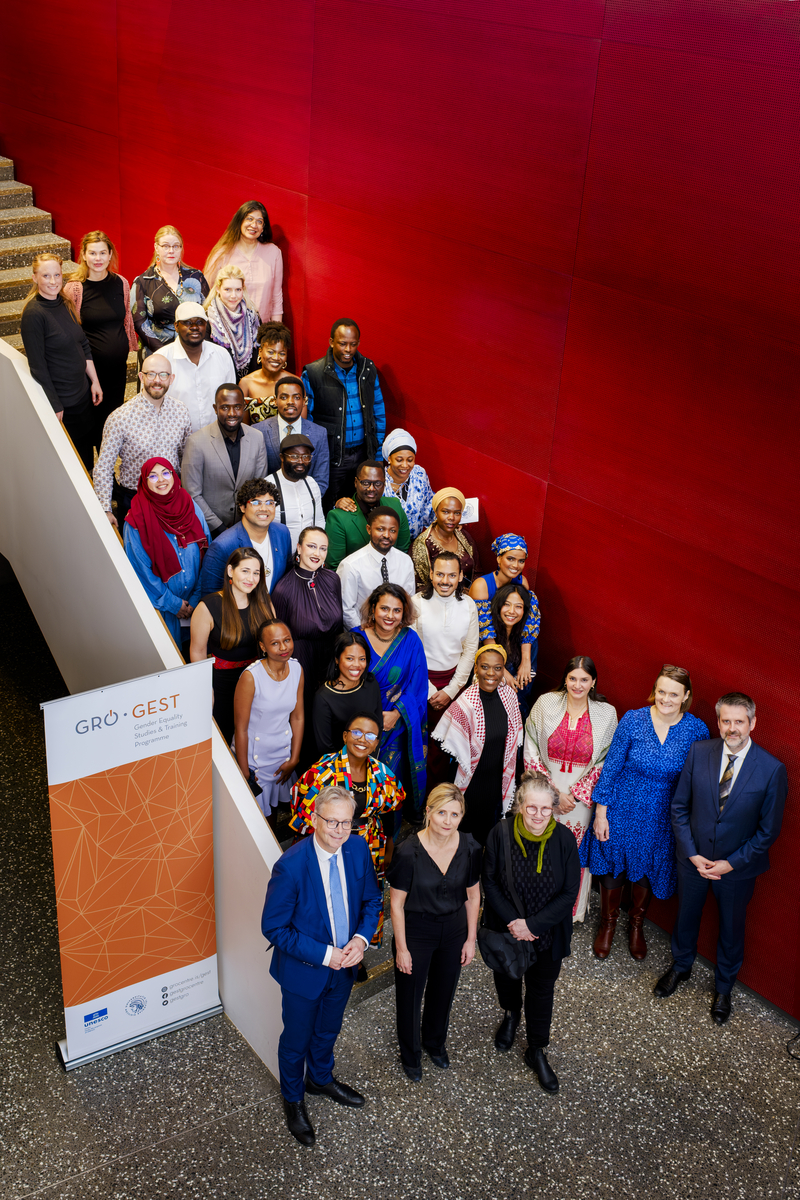The GRÓ GEST program at the University of Iceland celebrated, on Friday 24 May 2024, the graduation of its 16th cohort of young gender equality professionals and emerging scholars from the following countries: Uganda, South Africa, Ghana, Kenya, Palestine, India, Malawi, Sri Lanka, Bosnia & Herzegovina, Nepal, Pakistan, Rwanda, Madagascar and Liberia. The class of 2024 is made up of passionate gender equality practitioners from diverse backgrounds within government, non-governmental organizations, the media, arts, academia and other fields.
During their studies, the fellows completed six interdisciplinary modules: Theories and Concepts in Gender Studies; Project Development Tools; Gender, Violence and Security; Gender, Labour and Migration; Gender, Environment and Climate Change; and the Final Assignment. Many international and Icelandic scholars have contributed to the programme.
It is the 16th graduation of GEST, and the fifth graduation of GEST as a part of GRÓ Centre for Capacity Development, Sustainability and Societal Change. With this year’s cohort of 23 graduating fellows, the total number of GEST alumni is 241, adding to an ever-expanding alumni network.
The graduation ceremony
The graduation ceremony was attended by GEST fellows, supervisors, staff, and guests. Irma Erlingsdóttir, the Director of GRÓ GEST, delivered the welcome remarks, and Jón Atli Benediktsson, the Rector of the University of Iceland, and Martin Eyjólfsson, the Permanent Secretary of State of the Ministry for Foreign Affairs, addressed the ceremony. Operations Manager Guðrún Eysteinsdóttir, Ólöf Garðarsdóttir, the Dean of the School of Humanities, Védís Ólafsdóttir, Project Manager and Nína Björk, Director General of GRÓ Centre handed out the diplomas and rewards from the University of Iceland and the GRÓ Centre.
In his address Jón Atli Benediktsson stated that as students and advocates of gender equality, the graduates have not only acquired expertise, which will benefit people and organizations in their home countries; they have also contributed to the University of Iceland community. Martin Eyjólfsson emphasized that gender equality is a corner stone in Iceland´s international development cooperation and pointed to the important role GRÓ GEST programme plays in that respect. He also underlined that gender equality does not come about of its own accord and that Iceland owes its position on top of the World Economic Forum List to generations of women who fought for it.
Irma Erlingsdóttir thanked, in her opening address, all those who have contributed to the programme both in Iceland and abroad. She highlighted that GEST has built a diverse team of instructors who represent broad fields of knowledge and expertise from both the global North and South. She also noted that while gender equality remains a core value of the GEST programme, it has expanded its intersectional reach by focusing on issues relating to disability, race, class and LGBTQI+.
The Vigdís Finnbogadóttir award was presented for the best final assignments in two distinct categories. The award went to Mihitha Basnayake’s from Sri Lanka for the project “Towards Zero Period Poverty” and Ramatu Issah from Ghana for the project "Intersecting Forces: Religion, Culture, and Gender Dynamics in Child Marriage Amongst the Fulanis in Juapong, Ghana". They are here with Nína Björk Jónsdóttir, Irma Erlingsdóttir and Jón Atli Benediktsson. Photo: Kristinn Ingvarsson

The fellows’ address
The fellows’ address was delivered by Elizabeth Achola Mangeni from Kenya, in which she recounted the many joys and challenges of participating in the GEST programme. She also emphasized the symbiosis of the social and communal in the GEST programme, and how it can influence fellows’ long-term ability to affect change. As she put it: “As we recall the friendships we have forged, the networks created, the mentors who guided us in our research and projects, and the countless lovely memories we shared, let us remember that these experiences have contributed to our growth as students and individuals one step closer, ready and equipped to contribute to making the world a better place for all.”
At the ceremony, GEST fellow Enas Dajani from Palestine recited the poem “The ID Card” by Mahmoud Darwish, and fellow Hameeda Syed from India delivered an original spoken word piece “Þetta reddast”. The saxaphone player Guðjón Steinn Skúlason and guitar player Alexander Fryderyk Grybos performed the musical pieces “Ugetsu” by Cedar Walton, and “The Surrey with The Fringe on Top” by Richard Rogers at the beginning and end of the ceremony.
The Vigdís Finnbogadóttir Award
The Vigdís Finnbogadóttir award was presented—by GEST academic coordinator Thomas Brorsen Smidt and GEST research specialist Giti Chandra—for the best final assignments in two distinct categories. In the former category, Mihitha Basnayake’s project “Towards Zero Period Poverty” was chosen for the award. The project will establish a low-cost, biodegradable sanitary napkin production facility in Sri Lanka, which will make sanitary napkins more accessible, affordable and environmentally sustainable, alongside awareness campaigns to educate local communities about menstrual health and hygiene and challenge existing stigmas and myths. It is a project that will create job opportunities, reduce environmental impact, and empower women through increased knowledge and community support.
In the latter category, Ramatu Issah’s project Intersecting Forces: Religion, Culture, and Gender Dynamics in Child Marriage Amongst the Fulanis in Juapong, Ghana was chosen. Through in-depth interviews, the assignment gives voice to marginalized girls, who face oppression through cultural and religious practices and institutions. The research provides realistic and practical recommendations, which can change the lives of women and girls.




